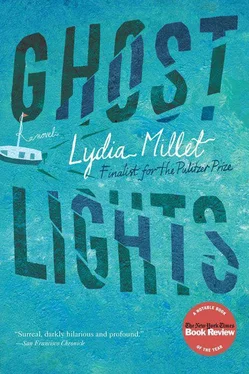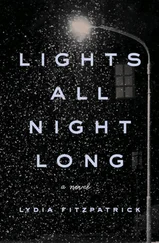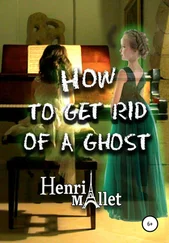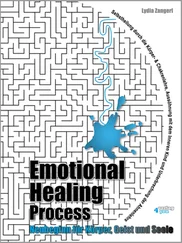Lydia Millet - Ghost Lights
Здесь есть возможность читать онлайн «Lydia Millet - Ghost Lights» весь текст электронной книги совершенно бесплатно (целиком полную версию без сокращений). В некоторых случаях можно слушать аудио, скачать через торрент в формате fb2 и присутствует краткое содержание. Издательство: W. W. Norton & Company, Жанр: Современная проза, на английском языке. Описание произведения, (предисловие) а так же отзывы посетителей доступны на портале библиотеки ЛибКат.
- Название:Ghost Lights
- Автор:
- Издательство:W. W. Norton & Company
- Жанр:
- Год:неизвестен
- ISBN:нет данных
- Рейтинг книги:5 / 5. Голосов: 1
-
Избранное:Добавить в избранное
- Отзывы:
-
Ваша оценка:
- 100
- 1
- 2
- 3
- 4
- 5
Ghost Lights: краткое содержание, описание и аннотация
Предлагаем к чтению аннотацию, описание, краткое содержание или предисловие (зависит от того, что написал сам автор книги «Ghost Lights»). Если вы не нашли необходимую информацию о книге — напишите в комментариях, мы постараемся отыскать её.
How the Dead Dream
Ghost Lights
Ghost Lights
Ghost Lights — читать онлайн бесплатно полную книгу (весь текст) целиком
Ниже представлен текст книги, разбитый по страницам. Система сохранения места последней прочитанной страницы, позволяет с удобством читать онлайн бесплатно книгу «Ghost Lights», без необходимости каждый раз заново искать на чём Вы остановились. Поставьте закладку, и сможете в любой момент перейти на страницу, на которой закончили чтение.
Интервал:
Закладка:
“So,” he said. “I guess, goodbye?”
He leaned forward to embrace her, awkward as usual.
“You’ll get him out. I know you will. You are a good friend,” said Gretel with her arms around him. She smelled like cinnamon.
“Thank you,” he said. He was late now, for the driver.
He smiled at her again. Should he ask for her phone number, or something? Cheesy.
“Wait,” he said. “In case you ever come to Los Angeles.” He slid his messy wallet out of his back pocket, slipped out a business card. “This is me.”
“Thank you, Hal,” said Gretel softly.
He backed out of the room, turned and took the stairs two at a time. When he glanced over his shoulder she was braced against the railing of the balcony gazing down at him, face in shadow, the towel standing tall on her head like a crown.
•
The airport was a small trailer with a dirty linoleum floor, fluorescent lights overhead and a desk at one end with a few papers piled on it, an olive-colored metal lamp on a bendable arm and a stained paper coffee cup. The lights were on but no one was around, yet Hal was supposed to meet his pilot. He went to the bathroom, the size of an airplane toilet, and when he came out he saw a light through the building’s glass door.
On the airfield — all grass and weeds with a single thin, short runway that looked more like a driveway — sat a small plane. He pushed the back door open and walked over the grass toward it, suitcase in hand, slapping against his leg. It was almost completely dark out; a couple of lights on the runway had halos around them, and then there were the small lights of the plane itself and the squares of yellow that were its windows. The plane was small and white with a blue stripe on the side — a four-seater, he saw when he got close.
Its propeller was already whirring, there was a door open, and the pilot was seated, wearing a bulky headset. Hal put a foot up on the rim of the door to step in.
“Here, here,” said the pilot, and gestured for him to sit up front. It was tight, barely room to move.
“This?” asked Hal, raising his suitcase.
“Back there,” said the pilot.
Hal was sure they would skim the trees on takeoff. The night outside was daunting from the tiny cabin of the plane, its bottomless dark; he wore the headset the pilot had given him, but they hardly spoke. He recalled a phrase an FAA guy had once used with him on a commercial flight, discussing Cessnas just like this one: single-point failure . No backup systems in case of malfunction. As they taxied and rose up above the runway he willed himself beyond the plane, out of the frail and shaking capsule into the rest of his life.
L.A. was spread out far to the north, gray and blond and spidering everywhere — its fastness, its familiar blocky strip malls and wide boulevards with their unceasing traffic and smog and the glamorous jungly hills that rose above and housed the royalty. Everything was the same; his house was the same, even, full of the mundane objects he knew so well. . by now Susan had told Casey T. was alive. They would both know by now, and Casey, at least, would feel affectionate and grateful. But Susan’s gratitude he had foolishly squandered. By accusing her at the very moment of triumph, the moment of revelation, he had squandered all his credit. Such as it was. It should have been a pure gift, the culmination of a gesture that quietly knighted him; instead he had revealed his petty nature, his real motivation for leaving and coming here, thus giving the lie to any idea she might have had about his minor effort at heroism.
He had to get T. out of the hands of the Belizean cops. It was imperative. Both for Susan and Casey and for him, T. himself, because actually he did not deserve it.
A short time ago, before he went to the island, if someone had told him Stern was in jail Hal would not have objected too strongly. Only mildly, for the sake of politeness. He might have held the private opinion, in fact, that a few nights in a Central American hellhole could benefit the Armani-wearing shithead. But not anymore. Now he wanted to get the guy out, partly because he seemed a painfully easy mark, now that he had gone hippie. Hal had always had a weakness for hippies, despite their free-love tendencies. Between them and the libertarians, he’d take hippies. Now — a benevolent-seeming, almost submissive individual — T. was without defenses. He would be instantly victimized, by either the thugs in the police force or his fellow inmates. It was ugly to contemplate.
Often people prefaced a stupid remark with the words “There are two kinds of people in the world,” and Hal had always been annoyed by this. The words tended to introduce a false dichotomy, an infantile reduction. At the same time he, too, felt the urge to divide and categorize, the satisfaction of separating the world into discrete parts that could be identified. If T. had once been a person who thought chiefly of himself and his shining Mercedes, he was now something else — if only on a temporary basis.
For it was entirely possible, as Susan had suggested, that he would revert to his usual form once the trauma of the hiking misadventure was past. People tended to settle back into their old routines. Returns to form were standard. Fundamental character change was all but impossible.
Still, for now he more closely resembled the pet lovers, for instance, than Donald Trump or Leona Helmsley. He was like the post-hippie nomads that drove around in painted vans, let their children grow dreadlocks and lived on pennies. He had the beard and the hygiene, anyway. But the key distinction was this: he had gone from being consumed with his own life and advancement to looking outward. Whereas Hal himself, once youth had passed, had gone the other way.
For there had been an interval, while he and Susan were both young, when he too had thought of the rest of the world quite often. He had often thought of justice and liberation, of the good of mankind, etc. But then he had forgotten it.
Except for his job, he had argued to himself over the years, but he had to admit it: even the job had become little more than a sinecure. He could not argue that in going to work every day he made a sacrifice of himself. It was more like a well-fitting shoe that was worn all the time but was never noticed.
If there were in fact two kinds of people in the world, those who faced inward and those who looked out, he had been the latter and turned into the former, whereas Stern, or T., had been the former and turned into the latter. It was T. who was taking the road less traveled, whereas Hal, with all his ideas about a government that protected and sheltered the people, with his lifetime of civil service, had in fact become a typical domestic drone, a man wrapped up in the details of his own life and only his own.
He had acquired the habit of blaming the accident for this. And yes, the accident had made it easier to shelve the concerns of the world, to relegate them to the back burner. But if he was honest, the patterns had been worn into him years before the accident, possibly even from the time when he manipulated Susan into abandoning her commune. He had manipulated her away from her youthful Eden Project ideal out of a sense of desperation, true, but that did not excuse his cynical calculation. He had been desperate to keep her and had reassured himself that love was enough reason for manipulation. But it was selfish and nothing else. Love had been an excuse, more than anything, for greediness. Love and self-interest had coalesced.
And separated from her Mendocino ideal — from the future of fresh air and the fields of organic strawberries — in time she had given up public high-school teaching, with its long hours and low pay and frequent disappointments, and become an assistant to a real-estate guy. This was after the accident, of course. . she had taken an office job, become an office worker. He himself was an office worker too, nothing more than a glorified clerk, really, but still: who knew what she might have become if, back in 1967, instead of manipulating her he had just let her go?
Читать дальшеИнтервал:
Закладка:
Похожие книги на «Ghost Lights»
Представляем Вашему вниманию похожие книги на «Ghost Lights» списком для выбора. Мы отобрали схожую по названию и смыслу литературу в надежде предоставить читателям больше вариантов отыскать новые, интересные, ещё непрочитанные произведения.
Обсуждение, отзывы о книге «Ghost Lights» и просто собственные мнения читателей. Оставьте ваши комментарии, напишите, что Вы думаете о произведении, его смысле или главных героях. Укажите что конкретно понравилось, а что нет, и почему Вы так считаете.












